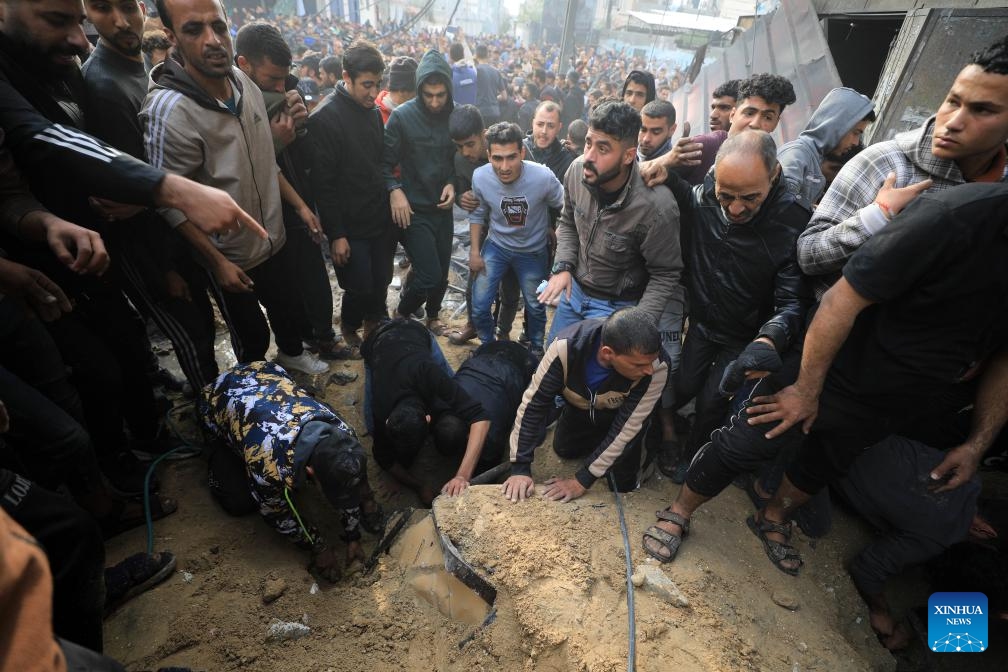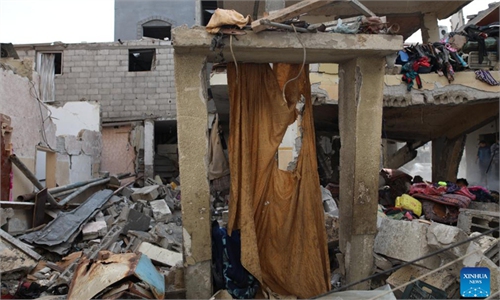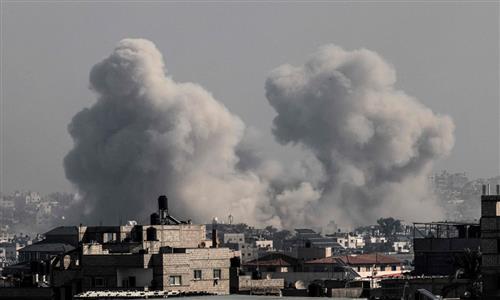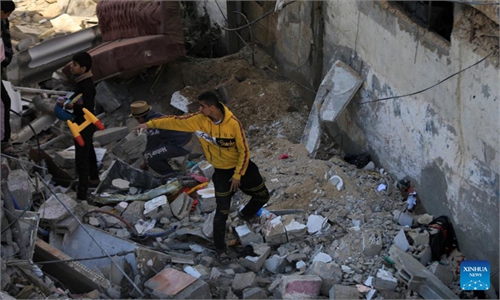As vote on Gaza resolution gets repeatedly postponed, US under pressure to avoid further isolating itself

People conduct rescue work after an Israeli airstrike in the southern Gaza Strip city of Rafah, on Dec. 20, 2023. The death toll of Palestinians from Israeli attacks in the Gaza Strip since Oct. 7 has reached 20,000, according to a statement issued by the Hamas-run government media office on Wednesday.(Photo: Xinhua)
With the death toll in the Gaza Strip reportedly surpassing a staggering 20,000, calls are mounting for the US, a veto-wielding permanent member of the UN Security Council (UNSC), to avoid further isolating itself from the international community and undermining the global efforts aimed at achieving a cease-fire of the Palestinian-Israeli conflict, as the UNSC was scheduled to vote on another resolution on the issue, after it was postponed multiple times this week.
A United Arab Emirates-sponsored draft resolution was originally scheduled for a Monday UNSC vote, but it was pushed back to Tuesday, Wednesday, and finally Thursday. According to some foreign media reports, despite the resolution's diluted language and replacement of "cessation of hostilities" for "cease-fire" in order to reach a compromise, the US, which has always supported Israel at the UN, has been reluctant to give it a pass.
As the world watches whether the US will vote in support of or at least abstain from allowing the UNSC to adopt its first binding resolution on the Palestine issue since this round of conflict began, analysts said that the moral weight continues to mount on the US.
The Gaza Government Media Office said on Wednesday that since Israel began bombing the Gaza Strip more than ten weeks ago, at least 20,000 Palestinians have been killed there, of whom at least 8,000 were children and 6,200 were women, media reported.
The US is in a precarious situation, as it is trying to back Israel but fears more isolation from the international community, which was made clear by the tense diplomatic negotiations taking place at the UN right now, Sun Degang, director of the Center for Middle Eastern Studies at Fudan University, told the Global Times.
The wrangling over the wording of the resolution shows the US' struggling to defend the "legitimacy" of Israel's actions in Gaza, said Sun, noting that the US and Israel consider Hamas to be a terrorist organization and do not see it as an equal counterpart, said Sun.
International discontent with US partiality has grown as a result of the country's past favoritism for Israel and its history of vetoing UN resolutions pertaining to the Palestinian-Israeli conflict. American dissatisfaction with Israel is also growing, increasing the possibility for the US to pass the resolution, Tian Wenlin, a research fellow at the China Institutes of Contemporary International Relations, told the Global Times.
Israel's military claimed it had uncovered a major Hamas command center in the heart of Gaza, while Israel's economy has been severely impacted by the military operation. The Red Sea raids by Yemen's Houthi rebels have also had an impact on international shipping and Israel's economy, adding to the momentum for another truce in the Palestinian-Israeli conflict, said Tian.
Reuters reported on Thursday that Hamas leader Ismail Haniyeh traveled to Egypt on Wednesday to negotiate a fresh agreement for Hamas to exchange Israeli hostages for Palestinian prisoners held by Israel and a temporary cease-fire.
The US' inability to promote a cease-fire or defuse the situation since this round of Palestinian-Israeli fighting began indicates that its leverage in the Middle East is eroding, along with its hard and soft power, said Sun.



